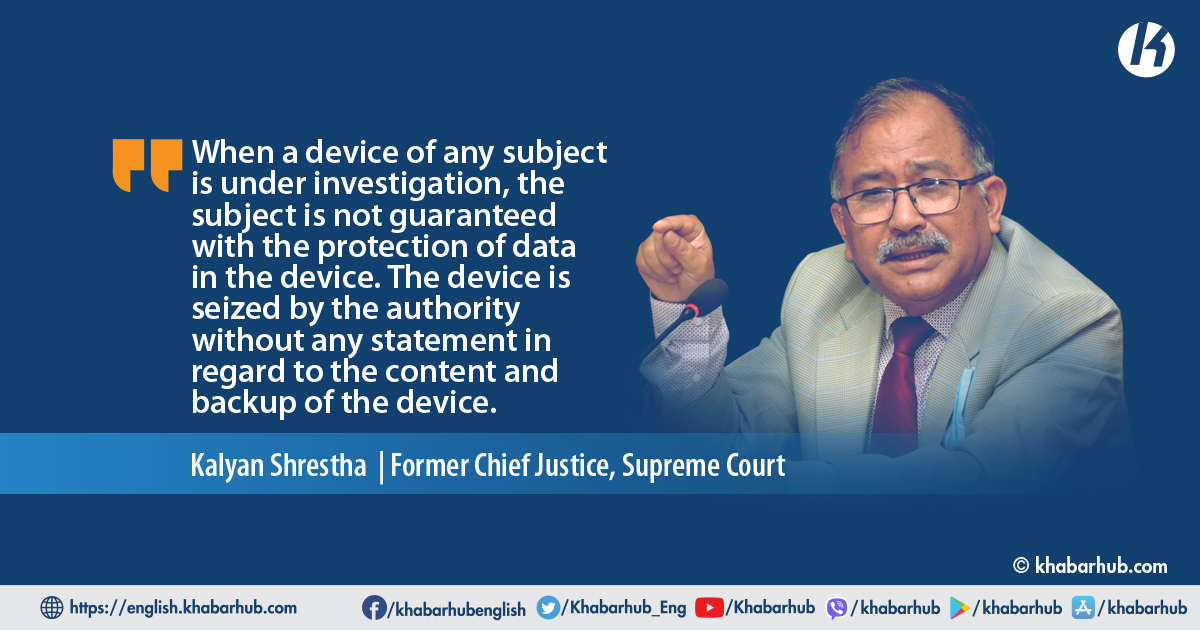The International Commission of Jurist (ICJ) has been studying digital rights and digital technologies from the perspective of human rights for quite some time and has been trying to explore the connection between digital technologies, digital rights and human rights imperatives.
This is a global issue and the world urgently requires to hold intensive dialogues to bring out a common standard framework that can encourage continued innovation in the further development of digital technology, which simultaneously empowers the people to build their capabilities to exercise their democratic rights.
This will also enable them to enjoy the benefits of it without compromising the recognition, protection and fulfillment of fundamental human rights.
Debates on this issue have been taking place in the digitally more developed western world and they are heading towards taking concrete shapes in suggesting the standard norms so that prospects of digital technologies and human rights imperatives are harmonized for serving the needs of humanity.
Yet we are still quite far from forging a consensus in terms of devising a way out that can be generally acceptable across the world.
Our legal systems have been facing various orientations influenced by the kind of values of governance determined by political ideologies and systems.
South Asia and South East Asia have been passing through different stages of development in terms of digital rights and digital technologies for common netizens.
Digital rights and digital technologies are obviously intertwined and the level of development in the area of digital technologies would influence or impact the kind of enjoyment of rights emanating from them.
We have an internationally recognized set of human rights that are implementable nationally and internationally.
Digital rights, obviously are an extension of fundamental rights over the internet, making difference in the forum where the right holder acts.
In addition to traditional rights, it can also be seen as a new right that emanates from the development and application of technologies that were unimaginable until recently.
We may not be able to comprehend the nature, scope and limitations of digital rights unless we are familiar with the nature, kind, operation and application of these technologies.
Technologies give us new avenues for our comfort and happiness coupled with challenges with continuing our established norms, habits, thought processes and structures of our society.
Our region is characterized by diversity in terms of religion, culture, and legal and political systems.
How we value individual good vis-a-vis common good in the context of governance, and how personal liberty is treated in the context of priorities of the government to defend the public interests will be shaping how sacred or sacrosanct our individual freedoms and democratic values are.
Not many complaints are being lodged by the people against the government for their intrusion on their freedom of expression and information as well as violations of privacy rights.
Our legal systems have been facing various orientations influenced by the kind of values of governance determined by political ideologies and systems.
Hence we have to engage in more constructive dialogues between different systems and between different actors representing legislators, lawyers, judges, technology companies and digital managers to share our experiences in relation to the impacts of digital technologies.
This will benefit the human rights community and the legal systems to enrich themselves through the progressive development of jurisprudence in the region.
I, too, had some opportunity to lead the drafting of the new penal code of Nepal which includes a chapter on crimes relating to divulging individual privacy.
But the interface between the law and technology couldn’t happen.
I wish more dialogues to encourage the interface between the law and science should be organized to bring them together in a spirit of harmony. I believe this is a unique dialogue.
Lex Informatica being the modern-day tech jurisprudence, will certainly give a concrete shape and establish standards in the world by hosting this kind of multi-sectoral workshop.
Digital technology companies and related institutions would be engaged in such meetings at times for their own purposes, but people like us would have less frequent discussions on different facets of the digital world vis-a-vis digital rights, digital principles, digital norms, digital limitations, digital jurisprudence and digital sovereignty.
It might be so because we find digital technologies and their applications a bit more difficult to comprehend for want of technical proficiency or we have not sufficiently attained the stage of digital technology development to fully understand their implications on our rights and remedies.
We have been silently receiving the technologies without seeking to participate in their design and development and without assessing whether they may have negative implications on the enjoyment of human rights.
The other hard fact is that we may not have the capacity to examine their implications unless they are experienced on the ground in the course of their implementation.
The accountability has to be towards the users and the society to explain why and for how long their information has been intercepted and how soon they would be relaxed.
As a result, we have not been able to bring out robust contemporary legislation which will address the implications of digital services on the rights and lives of people, informed by human rights imperatives.
Not many complaints are being lodged by the people against the government for their intrusion on their freedom of expression and information as well as violations of privacy rights.
Even if they would complain, due to the absence of appropriate law, transparent and proportionate processes, mechanisms, and remedial provisions, things might have gone unnoticed or unserved despite the apparent breach of human rights in the digital arena.
A massive psyche of lack of enthusiasm amongst the needful people and helplessness or uselessness amongst them are looming large all across in relation to invoking the enforcement or remedial mechanisms.
This is not a healthy sign for the working of any democracy. We might be fostering an environment of complacency at the expense of human rights, justice, security and development.
In addition, not many progressive judgments are coming from the judicial domain to guide the legislative and executive endeavors from the human rights perspective.
Even the colorable legislation that denigrates the dignity of people and subjects them to unequal treatment wouldn’t be annulled by the judiciary, instead, they seemed to have a more conformist attitude towards legislative provisions that give more authority to bureaucrats in the name of defending national interests.
Rather than doing so perhaps we have been accepting the legislations that would give high handedness to the government to exercise their authority to circumscribe the people‘s rights to freedom of expression, information, access to the internet, internet freedom, freedom of association, right to equality and non-discrimination right to privacy, etc. in the name of protection of sovereignty, security and public interests.
Whereas limitations on the enjoyment of such rights in the case of real threats to sovereignty, public security and public interests are legitimate in themselves but the limitations as such need to be legitimate, reasonable, clear and objectively assessable and adhere to transparency.
It is fundamentally questionable whether our region is bringing out legislation that fulfills the requirement of human rights norms in the digital context.
A high discretionary power bestowed at the hand of bureaucrats or the executive to have power to surveillance the information of individuals through the internet, power to blanket-shutdown the access and intrude on their privacy, for an indefinite period or for a substantially longer period without having a proper judicious review procedure and without being overseen by an independent body about the propriety of such limitations will be dangerous legislation from the human rights point of view.
However, investigating agencies not being able to internalize the principle set forth in the judgment tend to be invasive and are bent on obtaining other personal information (IP address, mobile number assigned, location) from social networking websites (Facebook/Meta, Twitter, Google) without such approval from the court.
We are not adequately considering the accountability issue that needs to be borne by the government or the technology companies serving from within or without intercepting the information of the people without a good cause in the eye of the law.
The accountability has to be towards the users and the society to explain why and for how long their information has been intercepted and how soon they would be relaxed.
The whole idea is to make sure that the authority of law to have surveillance shall not be abused by the government or by technology companies or both of them.
Nobody can be subjected to permanent surveillance or interception or inability to access/express and any such authority even if authorized by law must be questioned.
The role of the judiciary in such instances happens to be crucial to examine the rationale of the limitations or restrict the abusive behavior of the government or private companies.
They must not be given the blanket power to intercept or stop access indefinitely to the private information of the people for whatever reasons without the permission of the court.
In South Asia, the practice is to give the authority through the law wherever they are at the hand of government officials to allow for the interception, and even the review mechanism to oversee the such exercise of the authority would be headed by the senior bureaucrat rather than the judiciary.
In addition to the interception, there is a dire need to review the ongoing process of a criminal investigation of digital devices in our region.
The rampant, disproportionate and uncontrolled investigation of the digital devices of suspects raises a fundamental question about the right to privacy and the right to a dignified life.
Any device of the suspect, no matter of relevancy is being seized by the investigation authority without any warrant.
The uncontrolled seizure and investigation of digital devices without any standard protocol resulted in the massive invasion of privacy of suspects incriminating the suspects by their own devices and deriving poisonous evidence out of their own devices.
Whether it be interception or investigation of digital devices, the authority must be mandated by law to carry out such acts in a proportional manner in case of extremely necessary situations for legitimate aims in limited conditions with judicial warrant adhering to a legislative procedure and protocols.
The investigation techniques being arbitrary and ex-parte have not adhered to any sufficient safeguard to respect the rights of suspects and unilaterally invading the rights of subjects.
Furthermore, sharing of personal information in digital form in the name of an investigation by a private entity to the state investigator is also required to be managed.
The judiciary itself should be sufficiently familiar with technological development and should be able to understand the intricacies involved in their application.
In the context of Nepal, although we fail to have a legislative enactment for judicial approval before seeking personal information of a subject, we have a decision of the Supreme Court mandating the investigation agencies to obtain judicial approval before seeking call details and location reports of the suspects.
However, investigating agencies not being able to internalize the principle set forth in the judgment tend to be invasive and are bent on obtaining other personal information (IP address, mobile number assigned, location) from social networking websites (Facebook/Meta, Twitter, Google) without such approval from the court.
The norms of digital privacy and digital rights have been too formalist and have not been regarded as general norms to be adhered to in all similar contexts.
I am zealously waiting for judicial interventions when such occasions arise.
Who should be the person of authority to allow interception for a legitimate purpose may be arguable.
But European jurisprudence in this context seems to be more liberal and progressive that gives primacy to human rights over any issue of digital technologies.
They are quite strict that the permission must come from the judiciary and nobody else except the judiciary.
Period for phone tapping or interception will be obviously for a very limited period and subject to review within a very short span of time.
The process of interception will be disclosed to the people. These are commendable values for upholding human rights in any circumstance.
In our region, we are faced with varying degrees of problems relating to the realization of rights and exercising democracy.
Governance problems have marred all across the region from the rights perspective.
So more accountability should be fixed to hold governments and digital companies accountable for what they do to the people.
Even criminalization provisions together with punishment and reparations must be part of the criminal law to combat their abusive behavior.
For all those things to happen a competent and independent judiciary will have to be put in place with the jurisdiction of judicial review of the constitutionality of legislation.
Science and technology have moved way faster than the laws. It has been difficult for us to keep pace with the march of science and technology in order to match our laws.
The judiciary itself should be sufficiently familiar with technological development and should be able to understand the intricacies involved in their application.
But the judiciary is not much technologically informed and they are prone to submit to the opinions of technology experts.
Either people from technical backgrounds will have to be recruited for the judicial positions to hear matters like these or more capacity-building programs will have to be organized for the existing members of the judiciary.
A definite strategy will have to be adopted by the judiciary itself or by the state.
Similar capacity issues may arise in the case of other legal professionals and human rights defenders.
As regards the bureaucracy and technology companies from whom we are expecting compliance with the human rights norms, they need specific training on human rights and the interface between the law and technology.
They need to understand that they can develop technologies and monitor implementation but not at the expense of human rights, justice and security of humans.
A more sustainable digital future can be overseen not from the conflict between law, rights and technology but from the harmony between them.
At this phase, we may be confronted with defining what are digital rights and digital principles.
Streamlining the understanding of digital rights and digital principles may be helpful in guiding us in the design and development of digital legislation in the real sense of the term.
It may be submitted that digital rights may be considered to encompass among others, the right to use digital content, to access electronic devices like computers, the right to privacy, the right to create digital content, to express digitally and to report what seems inappropriate.
These are specific to technological uses and existing human rights norms will have to be attuned to the digital contexts.
Regarding digital principles, some proposition laws have been made to include issues like promoting the sustainability of the digital future, to increase safety.
The whole realm of digital rights, principles, jurisprudence, and justice is yet to take root.
Bringing a robust law on digital rights informed by democratic values and human rights imperatives will be a significant positive contribution of the government to democracy and prosperity of the people and that part has to be encouraged.
Even so, they may be significantly in need of designing our structures and enhancing our understanding of digital rights and digital technologies.
Science and technology have moved way faster than the laws. It has been difficult for us to keep pace with the march of science and technology in order to match our laws.
We are asked to refashion ourselves with their development. This is however not to say that we enslave ourselves by any technological development that may take place.
Human rights should be our lens to look at them for the present purpose.
Technological developments should not be destructive to our fundamental human values, rather they need to be in consonance with human freedom and security.
The crux of the entire discourse is that freedom of expression and information and the right to privacy offline should be equal to those freedoms online too.
They cannot be denigrated in any sense, by any means and under any pretext.
Digital rights that are seen as a miracle to bring people together with more rapid and accurate information with fair and equal treatment for all are not equally enjoyed.
Digital private companies have more power in denying access to information.
They can shut down their networks to disarm the people or spread hate speech and for no fault on the part of the individual.
Interception may disarm the people or violate the people’s rights making their lives not livable.
Democratic expeditions in the region are not without problems.
Internet shutdowns, interception, biometrics, phone tapping, intrusion on individuals’ privacy, hate speech, etc. are at times being played back at the behest of governmental interference against the people to disarm them from taking part in political processes or for suppressing the people or their movements against the government.
Private technology companies have also been serving as the extended arms of the government by carrying out the orders of the government in matters that violate or restrict the enjoyment of people’s rights.
There is no room for private companies to dishonor the order given by the government in lieu of violating people’s human rights.
These issues need to be taken into notice and should be addressed through reforms in lawmaking.
The investigating agencies need not have any prior approval, need not report the investigation or need not record the investigation, or need not follow any protocol or standard.
The nature of democratic governance will be largely determined by the nature of the laws we will be bringing in and by the nature of their implementation.
Bringing a robust law on digital rights informed by democratic values and human rights imperatives will be a significant positive contribution of the government to democracy and prosperity of the people and that part has to be encouraged.
I believe our future will be largely characterized by the kind of digital democracy and digital sovereignty we will bring hence we have to put our efforts to democratize our digital rights and digital laws.
I believe the workshop will be able to resolve many of our challenges by successfully culminating into recommendations good for ourselves and for humanity.
Some points to be considered:
Evidence Search and Seizure: In the context of other physical evidence from the crime scene, we have a law (procedure) to record whatever has been seized by law enforcement agencies.
Recognizing that the evidence may be manipulated by one party of the case (government), our law has explicitly stated the presence of independent people (local government representatives) during the course of the seizure.
In the case of digital evidence, only the device is recorded under the seizure deed.
However, the content of the device is not regulated, not reported and not controlled by any means.
There is no mechanism or protocol mandated by laws and regulations for the seizure of content in digital form.
Integrity of Evidence: The digital evidence is the only evidence that when destroyed/altered will not have anything remaining.
The integrity of digital evidence is always challenging. The subject is not sought for any kind of consent before examination of his/her digital device resulting in self-incrimination of the subject, using his/her evidence against him/her.
In this modern digital age, a simple device like a mobile phone has become almost like an extension of yourself, your soul and your mind. Such blatant invasion into your device may run against the spirit of the Right Against Self-Incrimination.
There is no standard procedure set forth for digital forensics. The examination itself in the device will impact the evidence which may not be retrieved back to its original form.
Additionally, in content related to digital crime, such as pornographic content and defamatory content stored in the device, there is no mechanism for permanent deletion of such content before such device is disposed of or sold by the court.
The subject is never informed about the procedure and protocol used in the course of the investigation of his/her devices.
Proportional investigation of devices: In a few instances it is reported and recorded that the investigation agency while investigating one case, looks upon the digital devices thoroughly and gets traces of evidence of another crime in the same device.
The question arises whether or not the investigating agencies should have unlimited access to the digital content of data without any kind of regulation.
The investigating agencies need not have any prior approval, need not report the investigation or need not record the investigation, or need not follow any protocol or standard.
This results in disproportional and arbitrary intrusion over the privacy of an individual.
Prior approval of Court: Although by the order of the supreme court, the investigation officer is required to get prior approval of the court before seeking call details and location records of a subject, the process of approval has been an additional formality only.
There are no single reported instances where the court has denied giving approval for the same.
Additionally, although the court ruling has mandated approval of the court for telephonic details, the investigation agencies are getting further private information (IP Address, phone number, location, etc.) from private service providers (social networking sites) without any court order or approval.
Evidence Protection and Deletion: When a device of any subject is under investigation, the subject is not guaranteed with the protection of data in the device.
The device is seized by the authority without any statement in regard to the content and backup of the device. In that situation, there is always a threat to the subject where his/her other data is being misused or deleted by the state party.
Additionally, in content related to digital crime, such as pornographic content and defamatory content stored in the device, there is no mechanism for permanent deletion of such content before such device is disposed of or sold by the court.
(Edited version of the speech given by Former Chief Justice Kalyan Shrestha at ICJ workshop on Digital Rights and Digital Technologies in Bangkok)









Comment